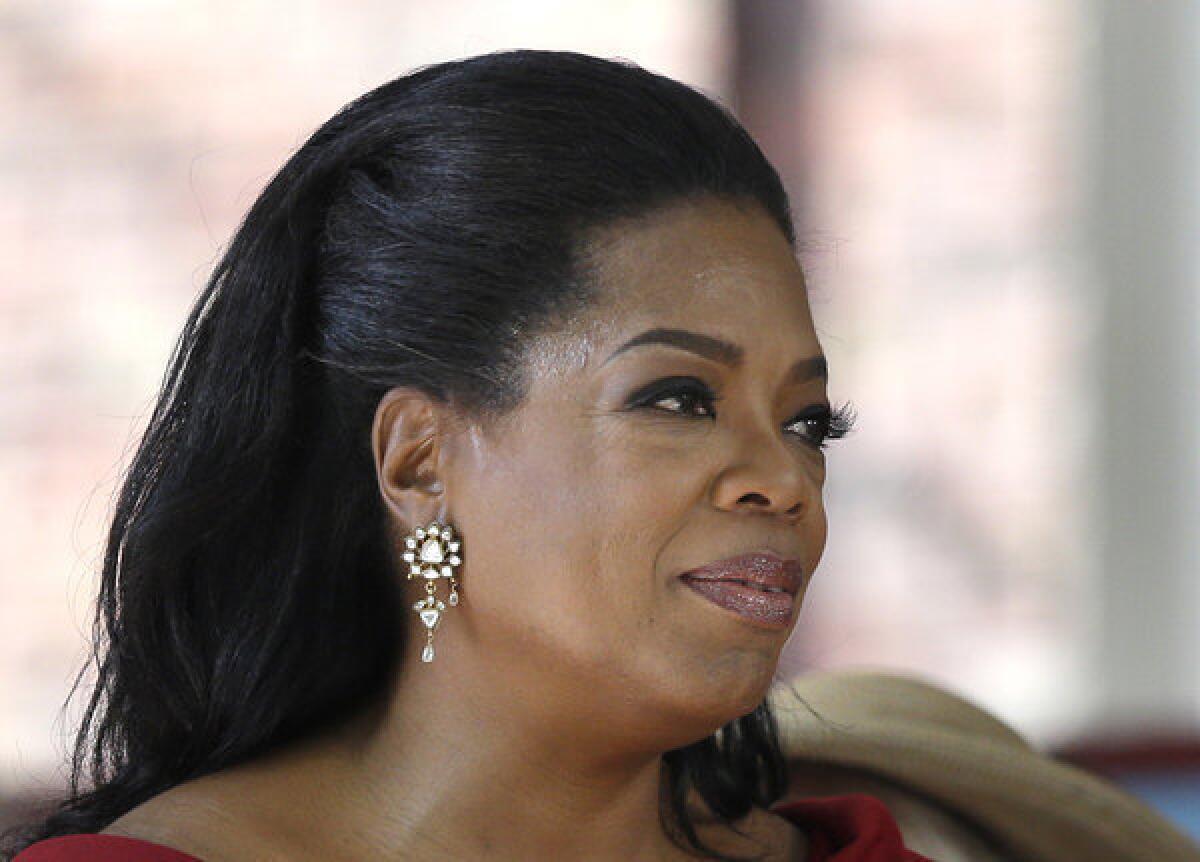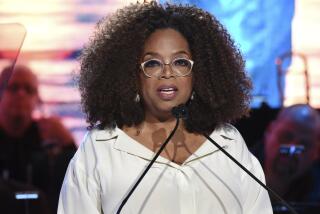Oprah Winfrey’s ‘racist moments’ are sobering

Oprah Winfrey is not only the world’s most powerful celebrity, and one of the richest. She is a marketing genius who knows how to exploit a racist insult to her advantage in a completely uncynical way.
More power to her.
Earlier this week, while promoting her new movie, “The Butler,” she disclosed in an interview with Larry King that when she was in Zurich recently for Tina Turner’s wedding, she had what she called a “racist moment” when a clerk refused to show her a handbag that costs more than some new cars.
Out shopping by herself, she’d gone into what she called a “name-brand” boutique, later identified in news reports as Trois Pommes.
“I say to the woman, ‘I would like to see that bag on the shelf, and she says, ‘No, that one’s too expensive, I’ll show you this one.’ And she proceeded to tell me how the bag was created for Jennifer Aniston, and I said, ‘No I really want to see the black one--it was lizard or alligator. I’m sure it was expensive.”
Briefly, she said, she fantasized about creating a “Pretty Woman” moment, recalling the scene where Julia Robert’s upwardly mobile hooker is snubbed by Rodeo Drive salesgirls, then comes back the next day, her arms filled with bags from other boutiques and tells them they’ve made a “big mistake, huge.”
Winfrey’s revelation prompted the Swiss tourism office to apologize to her and put the owners of Trois Pommes on the defensive.
In fairness, it was King who first raised the issue of race. He asked her whether at her rarefied place in the culture, she still experienced racism.
Indeed she has: “The higher up you go in the chain of capitalism,” she said, “people don’t expect you to be sitting at certain board tables. I sense it, and you know it.”
She alluded to a similar headline-generating incident that occurred in Paris in 2005, when the salespeople at the Hermes boutique on the fabled Rue du Faubourg St-Honore refused to let her into their boutique because, they said, she’d arrived just after it closed, and the staff was preparing the store for a private presentation of its clothes.
Fame and fortune are no innoculation against racist impulses. In a story about the Oprah/Hermes dust-up, then-Washington Post fashion critic Robin Givhan noted that actress Vanessa Williams was once mistaken for a waitress at a party even though she was wearing a gown. And that former Secretary of State Condoleezza Rice once reprimanded a saleswoman for showing her costume jewelry instead of the nicer pieces she had asked to see.
Years ago, Winfrey told King, she and her hairdresser, Andre Walker, were walking on Madison Avenue in New York high spirits after taking in a Broadway show, (“Sarafina!”). She spotted a sweater in a store window.
“They wouldn’t open the door, and they wouldn’t open the door,” Winfrey said. “I am not the person who pulls the race card, so I am like, ‘Wow, gee, do they see us out here?’”
She and Walker went across the street to find a phone and called the boutique. “They said, ‘Yes, we’re open.’ OK, coming over!”
No one recognized Winfrey. The doors stayed locked.
“We had seen these two white women go in the store,” Winfrey said. “Suddenly it dawns on both of us: Oh my God, I think we’re having a racist moment! And it was.”
How does she know? Because, she said, she called the store later to complain and was told that two black people had robbed the store a week earlier, and “they were afraid to open the door.”
When the store offered to send her the garment for free, she declined. “I said, ‘Keep the sweater.’”
What a great reminder to people invested in the idea of a post-racial America (and also in the idea that Western Europe is some sort of racial paradise for blacks) that daily insults and suspicion are an enduring part of the black experience.
And, not that it matters quite as much, but what great publicity for “The Butler,” a new feature based on the life of Eugene Allen, an African American man who served eight presidents. Winfrey plays the butler’s wife.
“Sometimes people would criticize me because they felt I didn’t do enough for race and racism,” Winfrey told King. “I try to tell stories that allow people to see themselves in the lives of other people.”
Well, almost no one can relate to buying a $38,000 handbag.
But by telling these stories about her “racist moments,” the most powerful entertainer in the country not only keeps herself real--a challenge given her estimated personal worth of some $2.9 billion--she demonstrates that everyday acts of racism are alive and well in a world that so often wants to persuade itself otherwise.
ALSO:Development near Hollywood fault allowed without seismic study
Woman’s body found in search for missing investigator
Amber Alert manhunt in ‘extremely rugged’ Idaho wilderness
Twitter: @robinabcarian
More to Read
Sign up for Essential California
The most important California stories and recommendations in your inbox every morning.
You may occasionally receive promotional content from the Los Angeles Times.











